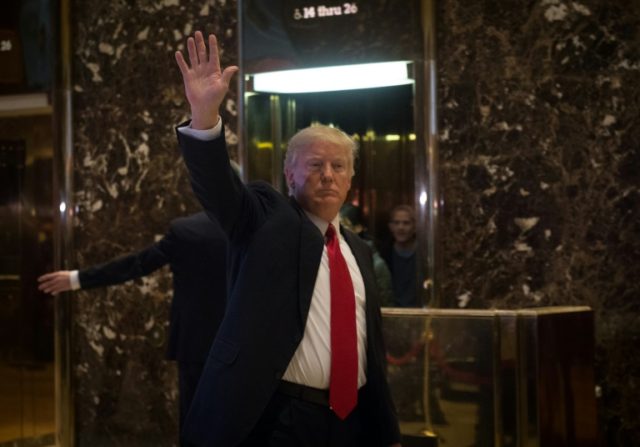Washington (AFP) – Donald Trump’s transition team has been invited to take part in Russian-backed peace talks on Syria, presenting a thorny first foreign policy dilemma for the new administration.
“We have been asked to attend,” Trump spokesman Sean Spicer told AFP Saturday, suggesting no RSVP has been given.
The talks co-hosted by Russia and Turkey take place in Kazakhstan later this month, three days after Trump’s inauguration.
Attendance by the new president’s team would be a strong signal of Trump’s determination to improve relations with Russia.
But he faces growing opposition to rapprochement within his own Republican party, amid allegations that Moscow had launched a subversive campaign aimed at tipping the US election in his favor.
Complicating matters further, the invite came during controversial exchanges between Trump’s national security advisor Mike Flynn and the Russian ambassador in Washington Sergey Kislyak.
Those exchanges, confirmed by US officials, took place as President Barack Obama’s administration rolled out sanctions against Vladimir Putin’s regime for trying to sway the election.
US intelligence has determined that Moscow intervened in Trump’s favor, but did not assess whether that action determined the outcome of the election.
Trump has rejected the intelligence community’s findings, saying he beat Democrat Hillary Clinton fair and square.
US participation in the Syria talks would be a major diplomatic coup for Moscow, cementing its role as Syria’s primary powerbroker.
Previous efforts to end Syria’s bloody civil war have been led by the United States and taken place with United Nations backing.
Senator John McCain, a Republican who is emerging as a thorn in Trump’s side, has said rapprochement with Russia is “unacceptable.”
“Another ‘reset’ would be complicity in Putin and Assad’s butchery of the Syrian people,” he said.
Russia’s aerial bombing campaign in Syria has turned the civil war decisively in Bashar al-Assad’s favor and put the United States and Europe on the back foot.
But it has also seen virtually indiscriminate bombings of civilians and allegations of Russian collusion in committing war crimes.
The Astana talks could cast the United States in the role of supporting actor.
However, Western diplomats caution that the United States and Europe still hold influence because an estimated $200 billion will be needed for Syrian reconstruction, a price tag well beyond Moscow.
– Tehran complication –
There could be added complications for Trump if, as expected, Iran also takes part.
Russia’s air force has worked hand-in-glove with Iranian-backed militias on the ground to defeat anti-Assad rebels.
Trump has been effusive in his praise of Putin, but has taken a hardline stance against cooperation with Tehran.
He has vowed to rip up President Barack Obama’s nuclear deal with Iran, and many key figures in Trump’s administration have a bitter history with Tehran and are likely to take a tough line.
It remains unclear if Trump would demand Russia cool relations with Iran as the price for better ties.
Tensions in the alliance between Tehran, Damascus and Moscow have bubbled for months, but there have been few public signs that any of the troika want a full-blown rupture.
– War against terror –
Trump has expressed hope that Russia could be an ally in fighting the Islamic State group in Syria and has taken Putin at his word that it is the goal of his operation.
That claim is roundly dismissed by the Obama administration and independent observers, who see Russia’s campaign almost exclusively targeting rebels.
The Institute of the Study of War, which monitors the Syria crisis, reported Saturday that last month saw heavy Russian bombardments designed to “siege-and-starve” opposition towns and bolster the regime.
“The primary target of the Russian air campaign during this period remained the acceptable opposition,” the group said, referring to anti-Assad rebels.
Despite the risks, the outgoing Obama administration said it would recommend Trump engage, though stopping short of recommending attendance at Astana.
“We have been in close contact with both the Russians and the Turks as this has gone forward,” said State Department spokesman Mark Toner.
“We would encourage the incoming administration to continue to pursue those efforts,” he said, adding that the focus must be getting UN-backed negotiations “back up and running in Geneva and aimed at solidifying the cease-fire in Syria.”

COMMENTS
Please let us know if you're having issues with commenting.